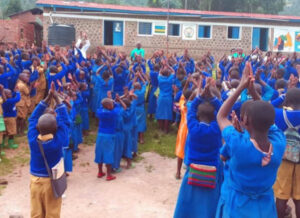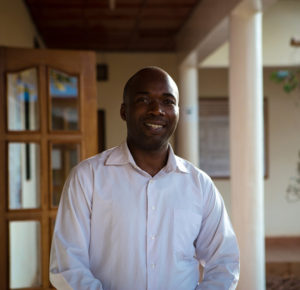Local health leader joins pandemic response at home and abroad
By Jay TurnerIn a recently posted TEDx talk as part of a new series on “Surviving Pandemics,” Dr. Anatole Manzi of Canton speaks passionately about the health care challenges inherent across large swaths of Africa and the essential role that teachers can play there in the fight against COVID-19.
Drawing on his own experiences growing up in rural northern Rwanda and his subsequent work as a global public health leader with Boston-based nonprofit Partners in Health (PIH), Manzi lays out his vision for a community-based health system with local educators serving a dual role as front-line responders.
“Although many schools have no nurse, no counselor, and no doctor, they have the teachers,” Manzi explained. “It’s teachers who know best their [students’] household situation and what steps are needed to respond. How can teachers play a role? By virtue of their proximity to the community, of their skills as educators, and of their commitment to their students and to their social welfare, teachers are the best suited to be rapidly trained and equipped as a greatly expanded public health workforce.”
More than just a distant dream, Manzi’s “applied health model” is a core tenet of his newly formed nonprofit, Move Up Global, and efforts are already underway at Nyabirehe Primary School in Rwanda — Manzi’s former elementary school — to train teachers to screen for COVID symptoms as well as to treat various neglected tropical diseases. Teachers at the school are also in the process of designing a “robust” soap-making project that would not only improve hand hygiene among students, but also help to supply soap to the entire community.
Such a project, according to Manzi, would make a world of difference for a community such as this one, where many live in “multi-generational households or crowded conditions,” where they have “no money to buy soap, often are food insecure, have no access to PPE, and need to walk long distances — hours and hours — to visit a nurse or a doctor.”
As a result, said Manzi, “Every teacher should be armed with the necessary knowledge and skills to detect and prevent the spread of COVID-19. Teachers should have thermometers. They should have PPE to protect themselves and to protect the students, and, most importantly, have an emergency response kit for at-risk families.”
And yet, despite these and other inequities, countries like Rwanda have done a significantly better job with their COVID containment efforts than many of their wealthier counterparts. (The Wall Street Journal recently spotlighted Rwanda’s “aggressive — and technologically sophisticated — containment strategies,” including the use of drones mounted with megaphones to broadcast public health messages, as well as more questionable tactics such as the detainment of thousands of people for various COVID-related infractions.)
Manzi, who has seen the pandemic response from both sides of the globe, attributed the success in parts of Africa to a variety of factors, including the strength of its community health systems as well as its past experience in dealing with health crises ranging from AIDS to Ebola to malaria.
“In the case of Rwanda, for example, where the pandemic is mostly contained and there are [few] new cases, it’s a poor country where over 60 percent live below the poverty line,” he said. “But the fact is that they have a very strong community health system. Within one day information could come from the national public health ministry to the very last person in the community. And the shutdown was very quick and they respected staying at home despite their level of poverty, which is challenging.”
In the United States, where Manzi has been directly involved in the response efforts through his role with Partners in Health, he said the challenges have proven more difficult but they “shouldn’t be.”
“Here I see that we have obviously had some pandemics, but we did not do much in terms of learning and really redesigning our system to respond to subsequent pandemics,” he said. “Another gap that I see is how disproportional the resources are here. The level of disparity here is so profound that you would see one neighborhood with several cases due to the inability to isolate and quarantine or afford even very basic hygiene supplies and another one doing much better.”
Eliminating these disparities, and striving to ensure an “equity-centered COVID-19 response,” are central to the mission of Partners in Health’s U.S. Public Health Accompaniment Unit (PHAU), which the organization launched in April 2020 to “assist states, cities and communities in building comprehensive public health responses to COVID-19.”
While the organization’s focus continues to be on improving health systems in some of the poorest areas of the world, PIH saw an opportunity to improve health outcomes here at home by drawing on its 30-plus-year track record of fighting epidemics. It started by teaming up with the commonwealth of Massachusetts on the nation’s first statewide contact tracing program, and with the help of a multi-million-dollar investment from the Audacious Project, it launched the U.S. PHAU with a three-pronged focus: accompanying and advising government partners and community leaders, documenting learnings and sharing best practices, and advocating for progressive policy change.
Manzi, Partners in Health’s deputy chief medical officer for clinical quality and health systems strengthening, was tabbed to lead the second area of focus as director of the PHAU Learning Collaborative. In this role, he organizes workshops and webinars where public health leaders can learn new strategies and also share best practices for fighting the COVID pandemic. Topics range from testing to vaccination to communications and social mobilization.
“It’s more of a strategic problem solving approach where people get together and say, ‘Look, I have so many problems, but these are what I will call my vital few,’” said Manzi. “If I can tackle this, I could address almost 80 percent of my problems, especially with regards to pandemic preparedness and response.”
While initially open to a variety of stakeholders, Manzi said they are now focusing strictly on the “implementers” — people in the public health field, particularly those in state and city governments, who are “making a change in real time.”
“What I’ve seen is that people want to talk to each other,” noted Manzi. “I think people are exhausted to work alone. We reached out to probably five public health departments but the rest came to us.”
Having spent time strengthening health systems in Liberia and Sierra Leone during the Ebola outbreak, Manzi said one of the PIH best practices that he has emphasized within the Learning Collaborative is the importance of community engagement. In this spirit, he said one of the collaborative members has been working with faith leaders in their city to identify resources and also track where the resources are going and determine if they’re making an impact.
“There are many lessons that we have now and that people are sharing,” Manzi said, “and it’s actually really interesting how our global experience can be translated; it’s not copy/paste, because it’s a different context, but the definition of community is really standard and the power of the community is really standard. If you want to reach people of color in this country, for example, they are in their neighborhoods, they are in their churches, they are in their clubs. I think the best way is to engage the faith leaders, the community leaders, those who can actually be trusted to reach them and say, ‘There are resources available; use them.’”
While 2020 has certainly been a “very busy” year for Manzi, he said it has been both rewarding and humbling to be able to assist with the U.S. COVID response and to apply some of his work with PIH in other countries within the U.S. context.

Students at Nyabirehe Primary School now have electricity in their classrooms thanks to Move Up Global.
At the same time, he does not want to lose sight of his goals for his home country and he remains deeply committed to his work with Move Up Global, which he launched earlier this year with the help of friends and colleagues.
Already the team has achieved some concrete victories, including bringing electricity to the Nyabirehe Primary School while also securing a small donation of computers with internet access likely to follow. These upgrades alone, said Manzi, are a game changer for thousands of students at the school and their teachers.
He is also very excited about the soap-making initiative as well as the program to spot and treat tropical diseases, although both projects, along with several others that have been proposed, will require monetary donations and technical assistance to get off the ground.
Manzi, however, remains undeterred. “Everything that I have done with Partners in Health, I started small with one clinic, maybe one department, and expanded nationally and eventually to more than one country,” he said. “My hope with this organization is really to train teachers as an extended public health workforce and this approach, I believe, will probably expand across the country because it’s not the only school suffering from not having someone with a basic knowledge of public health and well-being.”
“I am optimistic that this model could work,” he added. “It’s very exciting. Funding is a challenge, but I am still very hopeful.”
To learn more about Move Up Global or to make a donation, visit moveupglobalworks.org.
Short URL: https://www.thecantoncitizen.com/?p=72050











